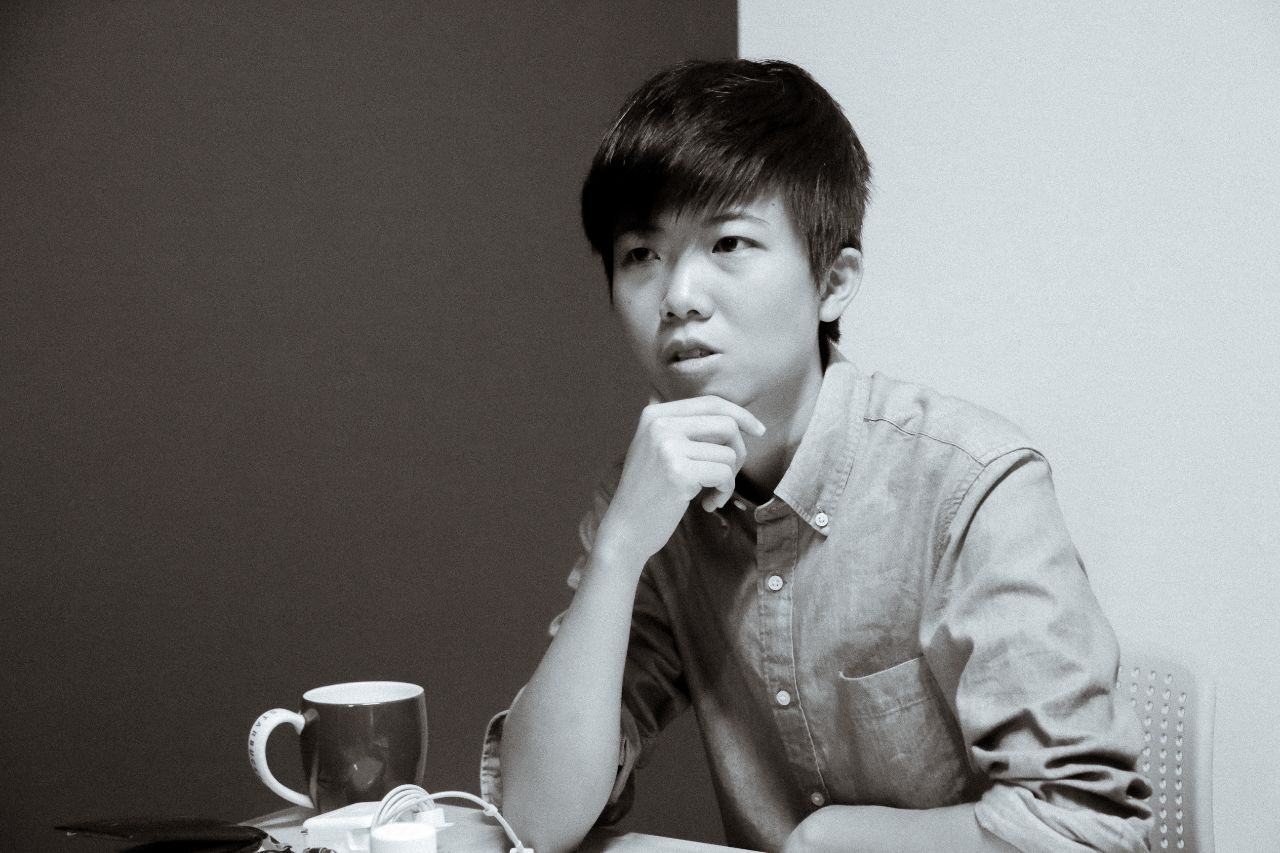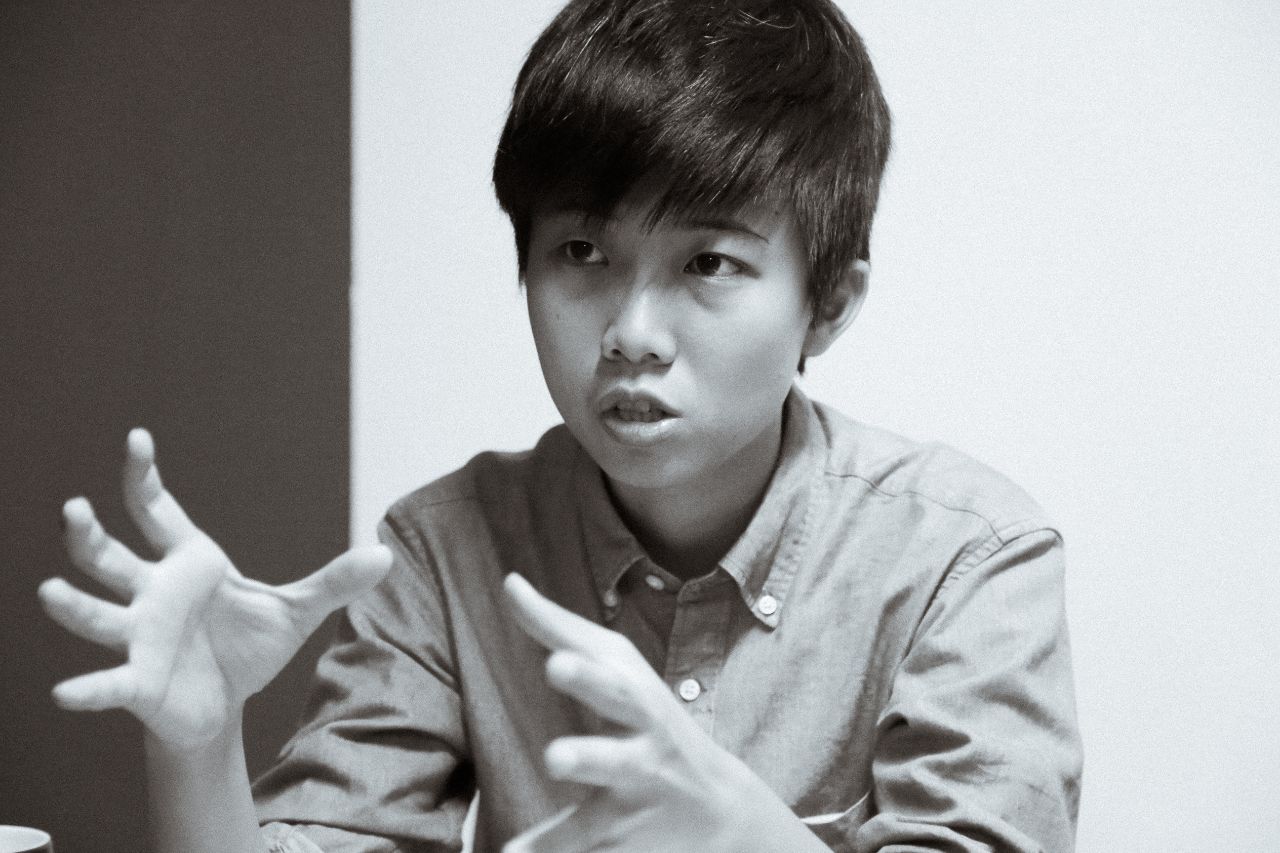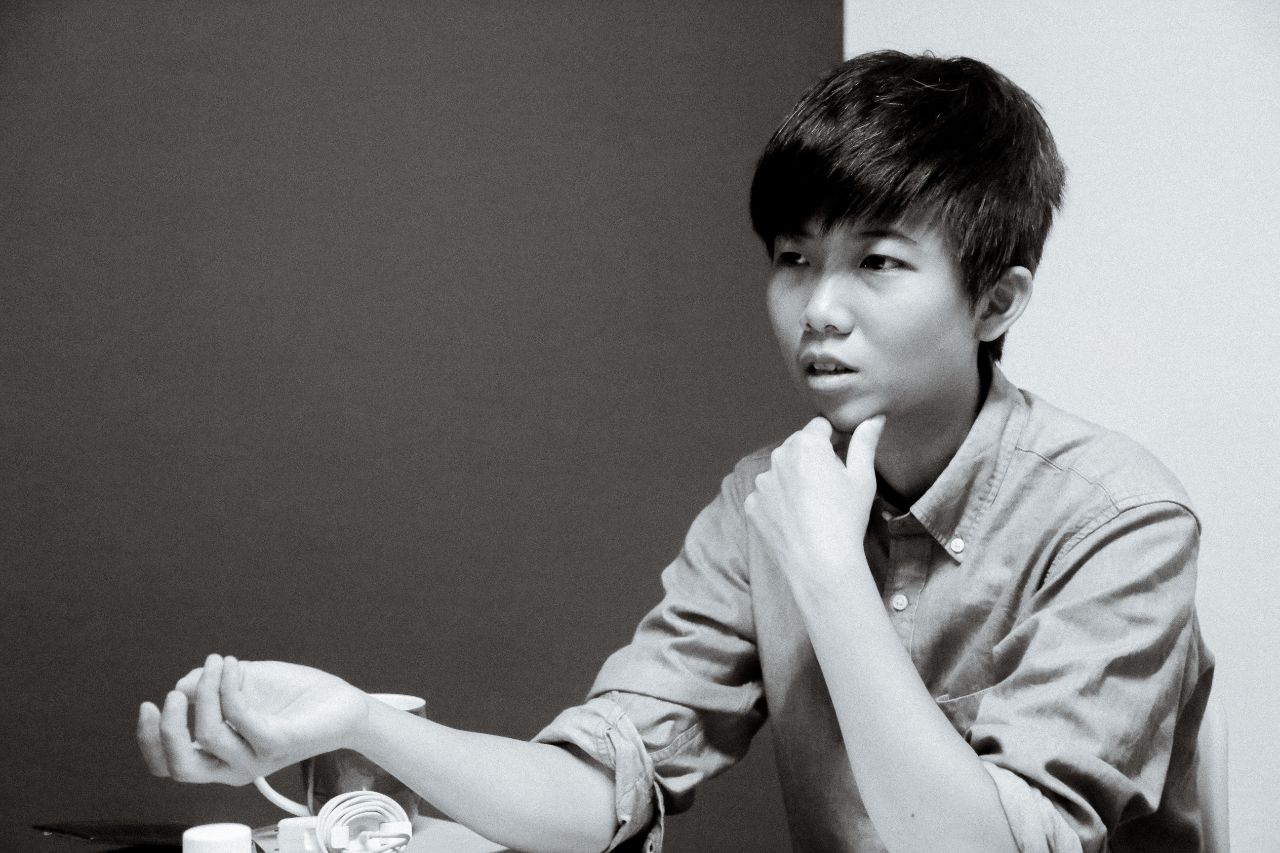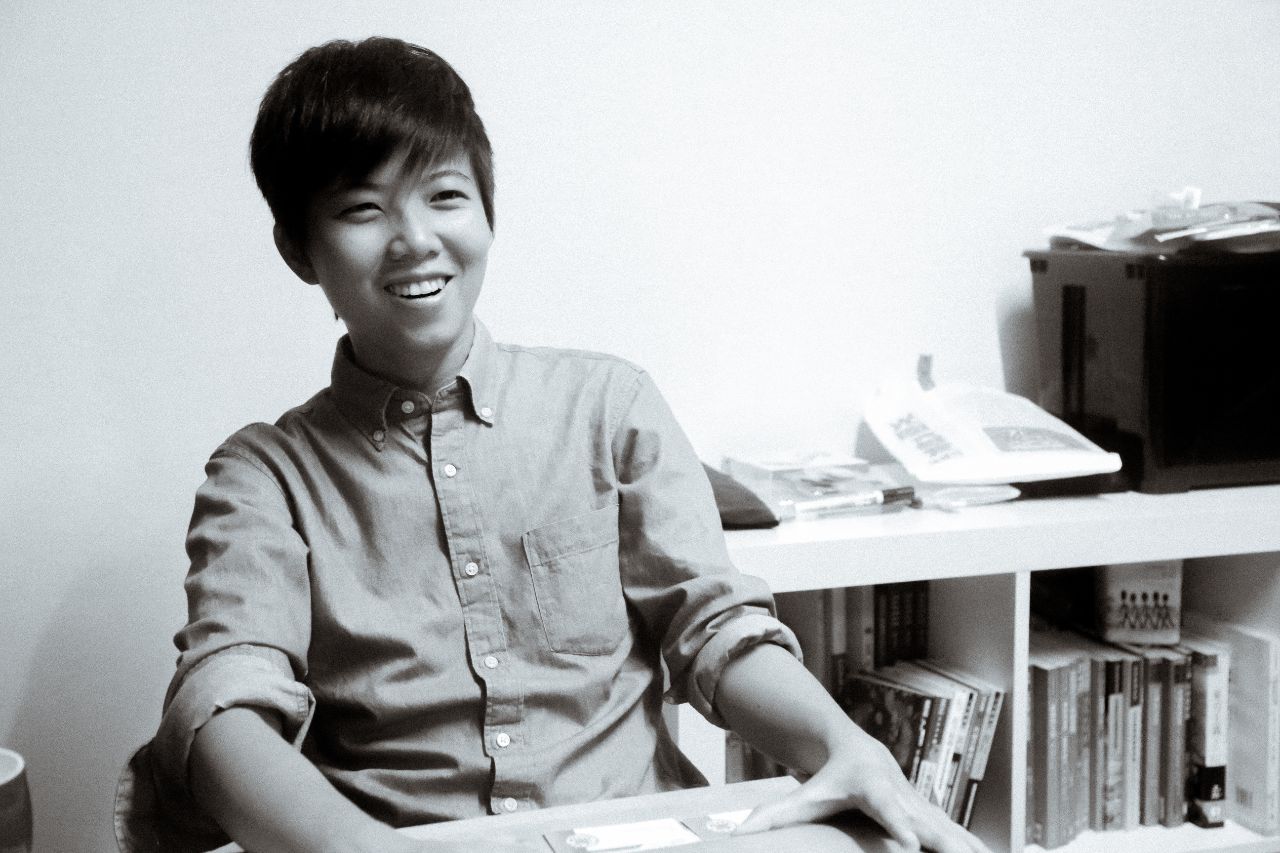by Ella Chen
語言:
English /// 中文
Photo Credit: 蘇思云
Translation: 王年愷
A familiar name in Taiwanese activist circles, Miao Poya has stood at the forefront of social movements, fearlessly expounding her views on issues ranging from the Sunflower Movement, to marriage equality, or to the abolition of capital punishment. This year, Miao decided to throw her hat into the ring for the 2016 legislative elections, standing as a candidate for the newly-founded Social Democratic Party in Wenshan District in Taipei City, and aiming to become an alternative to the political establishment in the legislature. Although only 28 years old, Miao manifests an incredible resolve as she recounts how she decided to enter politics, with her beliefs, and her determination to change Taiwan.
Political Beginnings
A “Blue” Waisheng Family Background
MIAO WAS BORN into a second-generation waisheng family, which had the pro-government United Daily News as its morning newspaper; as anyone would expect, her father’s loyalties were firmly rooted in the pro-government “blue” camp. (On one occasion, Miao posted an article on PTT, Taiwan’s largest BBS forum, arguing that the conflicts between people of Taiwanese and Mainland Chinese ancestry she had witnessed from childhood was, in fact, still rooted in class conflicts.) Demonstrating a love for reading from an early age, Miao started off reading the Mandarin Daily News her mother had subscribed to, but gradually found it to be stale and boring: “After reading it for awhile, you find that there really wasn’t much in it; they even featured works by children if you flipped it over.” With a chuckle, Miao said that she quickly outgrew Mandarin Daily News, and started to read United Daily News with the adults, never missing a single page. Because of this, she gained a clear picture of how the government operated, and of the political issues of the day.
“I would read newspapers from front to back in my childhood, instead of only reading the entertainment and sports sections. Because of this, compared to other people of my age, I knew more about politics and the political scene, or to put it in another way, what was happening in the narrow definition of so-called ‘political space’. I remember the first direct presidential elections in 1996: I was born in 1987, and I saw a billboard for [DPP presidential candidate] Peng Ming-min. My father was driving me, and he started to talk about the presidential elections.”
University Studies: The Beginning of Observations Upon Society
STRICTLY SPEAKING, Miao’s political awakening might have been inspired by the liberal academic atmosphere she found at National Taiwan University, which opened up a new world for her. In Miao’s words, her process of political awakening was slow and gradual: Growing up in a waisheng family, she realized that her university years formed the basis for the shift in her political ideology, at which point she found that she had to support herself by herself, or even become part of a greater force for advancement.
“A person’s years in university are extremely crucial, since during these years you are freed from the ideology perpetrated by the Ministry of Education through its compulsory textbooks. I feel that under such an environment, you come to know more about the past, present and future of Taiwan, far exceeding what we had in those establishment textbooks.”
Miao says her studies at the Department of Law at NTU “were in part, of course, equipping you with the skills to make money; some of the students might have learned to be very good at that, ha ha!” But, she continues, if one is fortunate (or perhaps unfortunate) enough, there were those courses focusing on subjects out of the ordinary, and it was through these courses that Miao understood that Taiwan always had “places which never saw daylight”.
 Photo credit: 蘇思云
Photo credit: 蘇思云
“According to the common point of view prevalent in Taiwanese society, NTU students are seen as ‘winners in life’ in one way or another. Even though all people have their own difficulties, when it comes to high scores, these are no doubt achieved through money, money, and money. If you came from a different background, or were raised in a financially troubled environment, you might not have achieved the same results.”
Criminal policy, criminal law, criminology, correctional theory, sociology… all these courses led Miao to understand that, even though individuals possess the capacity for mobility, there remains substantial parts within the structure of society that remain rigid. This revelation inspired a fundamental change in Miao’s life: “I couldn’t feign ignorance after knowing these things. It is one thing to remain ignorant, but that wasn’t the case for me. I felt I couldn’t remain the same.” She stresses that her foray into the thorny issues of the abolishment of capital punishment came out of her university education. Miao took part in debate competitions during high school, in which “the death penalty was a recurring subject, ha ha!” Because of this perennial exposure, she can directly point out the weaknesses of both pro- and anti-capital punishment arguments.
“However, if you are a student of law, you will no doubt know how the principle of proportionality as enshrined in the constitution is applied. If you are interested in criminal policy, criminal law, or the study of crime, you will have some knowledge of their fundamentals, and if you take the extra effort to study sociology, you’ll learn how to see society at a structural level. During this process of the accumulation of knowledge, you’ll find that your own conclusions and viewpoints will readily appear once you reflect on these issues. I would say this is a gradual process: the question of capital punishment is not isolated, it is in fact a question of political philosophy, it is a question of psychology, criminal law, and sociology, and it may even be a question of historiography. When you learn more in each of these different fields, you’ll reach a similar conclusion no matter how you approach the question.”
Running For Political Office
DOES MIAO HAVE any personality traits which set her apart from the normal law school student? Does she enjoy going into the crowds? Here Miao gives out an embarrassed laugh. She says, she does not know what traits she does possess, but she does know that she chose a path that the average law student would not have chosen — becoming a full-time social activist, and representing a newly-founded political party in a bid to become a legislator representing a defined constituency.
“I don’t quite know what led me to this. I can only say that, for my part, I chose this path first because of what I have encountered, and also because I have imagined a larger compass for my professional career. Being a lawyer, a judge, or a prosecutor is not a bad thing, since these careers carry much social prestige and bring in a large paycheck. But for myself, I feel that if something very important happens to drop in front of me, and if someone believes I am the one suited to do it, and also if I don’t find anything against it, then I should by all means go ahead and do it!”
“However, I can’t say that I’ve never ever had the qualities to become a politician, ha!” As Miao jokes, she does say that the thought of running in an election did not cross her mind in the past; yet, she adds, being a social activist in itself is a political act, since all social issues can only be resolved politically, whether through legislation or other means, “So I would never say I’m not taking part in politics.” She recounts how, in January 2015, National Taiwan University sociology professor Fan Yun asked her if she would join the Social Democratic Party and become a legislative candidate for a constituency. Miao, at the time intending to relax in Germany during Chinese New Year, was suddenly faced with the most significant turning point in her career. “I didn’t have the heart to have fun!” Even amidst the beautiful scenery of Europe, she couldn’t think of anything else.
“After much thought, I concluded that, first of all, this is a very important thing. The 2016 Legislative elections will determine the composition of our next parliament. Taiwan saw an unprecedented social movement aimed at the legislature in 2014, and if such energy in society doesn’t result in a change in our parliament, Taiwan’s path toward democracy will become ever more difficult. Second, as we all know already, Taiwan has twice experienced a change in ruling party, but this was only confined to the executive branch; the driving force in the legislature has never changed. Now that we have such a strong voice from the people, if we don’t manage to change the fundamental structure because of electoral policy or other factors, this will send a message to our politicians: ‘No matter how we fool around in the legislature, the people will never be able to do anything about it.’ It will also send a message to the people: ‘No matter what we do, the legislature will always be the same.’ This will only bear a negative impact on the development of Taiwan’s democracy.”
 Photo credit: 蘇思云
Photo credit: 蘇思云
Miao was born in a small OB/GYN clinic near Xikou Elementary School in Taipei’s Jingmei region, a part of Wenshan District. As a local resident of the constituency she seeks to represent, Miao has high expectations for the development of Taipei’s Wenshan District. With a chuckle, she says she does not dare to claim she knows every inch of Wenshan district by heart, but as a down-to-earth local, she knows first hand what the people of the region need. After the electoral districts were redrawn in the 2008 Legislative elections, Wenshan District has always been staunchly pro-KMT; in Miao’s words, under these circumstances, not much can be said about the legislator representing the district, since for the past two decades, the sitting legislator Lai Shih-bao has never proposed much for the region. Because of this, she hopes she can usher in some change for her hometown by running for office.
“Possibly due to the structure of the electorate here, in the legislative elections in 2008 and 2012, the KMT incumbent handily won the district by at least twice the number of votes as the runner up. Does this mean that the electorate does not accept progress, or are they unable to accept any non-KMT candidates? This is hard to say, because in the elections last year, the current Taipei City mayor Ko Wen-je carried the district with 51% of the vote. Even though he led the district by only a slim margin, this nevertheless tells us that the electorate here is willing to accept an alternative to the KMT, and if you present them with a new and distinct choice, they might have some new ideas.”
Choosing the Social Democratic Party
REGARDING HER choice of joining the Social Democratic Party, in addition to having accepted Fan Yun’s invitation, Miao firmly believes in the core values that the SDP represents. Moreover, her colleagues in the SDP joined her campaign because of her social activism, giving her much encouragement. In addition, she believes that Taiwan’s political spectrum could benefit from more diversity by offering people other choices than the established KMT and DPP. Miao says that in political terms, the KMT is the most distant from the SDP; on issues regarding unification/independence, Taiwanese identity, or society in general, the two parties have an irreconcilable gap. Regarding the DPP, even though she agrees with the DPP’s principles of political cleanliness, active participation, and love for one’s homeland, she believes that politics in Taiwan should involve more than just the unification/independence divide; in terms of economic development, the DPP still pursues a path of neoliberalism, a stark contrast from the ideals of the SDP.
“Frankly speaking, neoliberalism is just survival of the fittest, with the strong feeding off of the weak. Is this what we really want for Taiwan? Of course, Taiwan must be an independent country, but we must be an independent country with substance. Taiwan must pursue independence and international recognition, which is what the SDP believes in, but when we all live in the same country, we should focus more on what the substance of life in this country is. We don’t want a country where the fruits of economic growth goes to the 1% who see exponential growth in their bank accounts. We don’t want a society like this. We want a society where everyone who is dedicated to work and life can find fulfilment in their lives. During the past 16 years, regardless of whether the KMT or the DPP was in power, their economic policies and tax reforms were clearly geared toward big business. I think this is what sets the SDP apart from the two main parties.”
As a so-called “Third Force” party in Taiwanese politics, the SDP out of necessity must seek collaboration with other parties. The SDP is currently in a coalition with the Green Party, with the two parties nominating a joint party list for legislators-at-large. Regarding the New Power Party, Miao says that she personally sees them as friends-in-arms: “Quite a few of them are my good friends; maybe we differ in some policy details, but we don’t have any irreconcilable differences in our general directions.” Miao believes that core ideals and values must come first in collaboration between political parties or in determining issues; this is true for collaboration with other “third force” parties, or even with the KMT or DPP.
“In my opinion, all public policies should be dealt with in terms of face value. For example, university presidents across Taiwan have recently petitioned the Ministry of Labor to exempt universities from the Labor Standards Act. My personal stance on this issue can’t be clearer: If there is a clear act of labor involved, the Labor Standards Act must be enforced, and the Ministry of Education must take this into account in its budget. If any other political parties support this view, we should all work to achieve the same goal. Collaboration should not be based on party affiliation, but rather what views we have on a certain issue; if they are the same, then there’s room for collaboration. This is a more pragmatic way of politics: we don’t want a political scene where political parties are against each other all the time. We want politics in which values and policies are debated and discussed; in this aspect, party affiliation is not that much of an issue, but rather what values you hold.”
Social Media as a Campaign Strategy
ALTHOUGH RUNNING for office for the first time, Miao nevertheless has a rich set of ideas on how to market her campaign and the issues she is devoted to. The logos and fonts used in her campaign were borne out of a collaboration with professional designers; in addition, she often releases video clips on her Facebook page to clarify the legal meanings and concerns of various issues. Her lively interaction with Facebook users has made her a prominent figure on the social network, with her posts often receiving large numbers of likes and shares.
(Constitutional reform, explained in 4 minutes—so easy even a 5th grader can understand!)
(How we should handle the textbook revision controversy—a 5 minute primer)
Miao jokes that, as a young person herself, voicing her views on social media is her daily bread and butter; her utilization of this platform is not a ploy for youth votes. In addition, social media is a “cost effective” platform: with a smirk, she explains that resources tend to be scarce for younger political newcomers, and her team always seeks the most efficient way to get her message out.
 Photo credit: 蘇思云
Photo credit: 蘇思云
“If anyone offers free television airtime, of course we will put up an ad, ha ha! We use Facebook because it is free. For us young political newcomers, the one thing we can’t compare with is money. If you look at my opponent (Lai Shih-bao), in the 2012 election, he declared NT$2.5 million in expenses from his political donations in the Control Yuan report. Even if everyone in Taiwan donated a dollar to me, I’d still not have 2.5 million. Of course, I do try to look for funding, but I also try to find a way to campaign while keeping costs down; this is the first point, from a very practical point of view. Secondly, theoretically speaking, running in an election shouldn’t cost so much in the beginning, because if you need so much money, you’ll need contributions from big business, and if you do, you’ll need to repay them after you get elected. This is why Taiwan’s Legislative Yuan is in such a mess. Stemming from our fundamental values, we need to detach politics from the power of the dollar, and to do this we need to start from how we run a campaign, and at the very least from our spending during the campaign. Practically speaking, however, any free method of promoting ourselves is a good method.”
For the January 2016 elections, Miao is devoting all her efforts to get elected; even if things don’t come to fruition, she will still devote her energies to Wenshan District: “I wouldn’t like to declare I’m running for office, only to disappear if I lose; this would be irresponsible to the electorate.” With a firm voice, Miao pledges her commitment to the region: “Even more so, this is where I live! Where else could I go?” She says, even after the election, the SDP will still keep a watchful eye on progress in the legislature.
After spending some time campaigning, Miao has mastered the delicate art of introducing herself within 30 seconds. Whether she is greeting voters in marketplaces, on the streets, or at Mid-Autumn Festival celebrations, she aims to shake everyone’s hand. What do older people think about young election candidates? Miao laughs; she says she is always being told that she looks so young: “Wow, you are so young!” “Really? You look like a high school student!” Many older people feel excited that young people are willing to represent the area in politics. When greeting voters, Miao is often asked if she is “a boy or a girl”; she always brushes the question aside by saying she is a graduate of Taipei First Girls’ Senior High School. She says that she is not afraid of this question, since most people in society still need to know the gender of other people they meet, in order to determine how they interact with each other, and she understands their concern. Miao is not afraid of being “labeled” as such; she believes that, with a new space in Taiwanese politics opening up, the people are able to discern for themselves and choose what they really believe in, without being held under the sway of political parties; rather, they will strive for an ideal political environment and lifestyle.
Postscript
ANY WORDS for our global New Bloom audience?
 Photo credit: 蘇思云
Photo credit: 蘇思云
“The internet has given birth to many new media outlets in recent years. I think this is a wonderful thing. I don’t know if this marks a paradigm shift, but I do hope that Taiwanese audiences can offer their support for diverse, possibly small in size, but very dedicated new media. We often hear people say that the media environment is terrible, that reporters are terrible — I don’t think this is because Taiwan lacks good reporters, it is more because good reporters are limited by their editors, or even by pressure from higher-ups in the hierarchy, so that they can’t do what they want to do. If Taiwanese audiences can support such committed and passionate new media, I think this would be just wonderful!”




 Photo credit: 蘇思云
Photo credit: 蘇思云 Photo credit: 蘇思云
Photo credit: 蘇思云